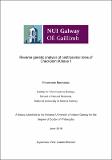| dc.contributor.advisor | Morrison, Ciaran G. | |
| dc.contributor.author | Basavaraju, Shivakumar | |
| dc.date.accessioned | 2019-06-14T13:11:00Z | |
| dc.date.issued | 2019-06-14 | |
| dc.identifier.uri | http://hdl.handle.net/10379/15227 | |
| dc.description.abstract | Centrosome duplication is tightly regulated process that occurs only once per cell cycle. Centrosome abnormalities have been observed in cancer cells and in cells with defective DNA damage responses. Genotoxic stresses lead to centrosome amplification, which is often observed in cancers. Increase in centrosome numbers per cell can lead to defects in cell division caused by improper alignment of the mitotic spindle in cells. Checkpoint kinase 1 (CHK1) is a key serine/threonine-protein kinase that controls cellular responses to DNA damage. Our lab and others have shown that CHK1 is required for DNA damage-induced centrosome amplification. How this happens is unclear, as DNA damage occurs in the nucleus of cells and is somehow signalled to the centrosome. In order to understand the mechanism and function of a protein it is essential to know the precise localisation of the protein. CHK1 is an extensively studied component of the DNA damage response (DDR), but its localisation with respect to centrosomes is unclear and controversial. In this thesis, we sought to study CHK1 localisation at centrosomes in chicken DT40 cells by tagging GFP to the 5’ end of the CHK1 locus using CRISPR/Cas9. The CRISPR/cas9 approach was very efficient in generating a GFP-CHK1 cell line and interestingly, we also generated several CHK1 null cell lines. We were also successful in disrupting CHK1 in MCPH1 null cells. We examined GFP-CHK1 localisation in GFP-CHK1 cells and failed to see any GFP-CHK1 at the centrosomes in either unperturbed cells or after DNA damage. Furthermore, we found that the loss of CHK1 ablated the centrosome hyperamplification after irradiation of MCPH1 null cells. Based on the successful CHK1 targeting in chicken DT40 cells, we sought to use CRISPR/Cas9 to target CHK1 in human cells. We disrupted a single allele of CHK1 in TP53 null hTERT-RPE1 cells. Loss of a single CHK1 allele led to decreased centrosome numbers in response to DNA damage. Primary cilia are mechno-chemical sensory organelles. Defects in primary cilia structure and signalling cause human diseases such as ciliopathies and cancer. Recent studies have identified genetic and functional links between ciliogenesis-related proteins and genome maintenance factors. We tested whether loss of a CHK1 allele had any impact on primary ciliogenesis. We found that loss of a single allele of CHK1 in TP53 null cells had greatly reduced primary cilia in numbers. We observed disorganised localisation of the centriolar satellite protein PCM1 in TP53-/- CHK1+/- cells. In summary, our data indicate that endogenously expressed GFP-tagged CHK1 does not localise to centrosome in chicken DT40 cells, although CHK1 regulates centrosome numbers after DNA damage. In human cells, we identify CHK1 as a positive regulator of ciliogenesis. Our analysis of CHK1 adds to the growing evidence for molecular links between centrosome duplication, ciliogenesis and DNA damage responses. | en_IE |
| dc.publisher | NUI Galway | |
| dc.rights | Attribution-NonCommercial-NoDerivs 3.0 Ireland | |
| dc.rights.uri | https://creativecommons.org/licenses/by-nc-nd/3.0/ie/ | |
| dc.subject | DNA damage response | en_IE |
| dc.subject | Primary cilium | en_IE |
| dc.subject | Centrosome | en_IE |
| dc.subject | Natural Sciences | en_IE |
| dc.subject | Biochemistry | en_IE |
| dc.title | Reverse genetic analysis of centrosomal roles of Checkpoint Kinase 1 | en_IE |
| dc.type | Thesis | en |
| dc.contributor.funder | Irish Research Council | en_IE |
| dc.local.note | Successful cell division requires the accurate segregation of chromosomes to two daughter cells. Defects in chromosome segregation lead to various human diseases, notably cancer. In animal cells, centrosomes ensure the accurate segregation of chromosomes during cell division. Centrosomes duplicate once per cell cycle, in a tightly controlled fashion. This is critical as centrosome overduplication can promote birth defects, developmental disorders, and tumorigenesis. In this study, we discovered that Checkpoint Kinase 1 (CHK1) protein as a positive regulator of ciliogenesis. Our analysis of CHK1 adds to the growing evidence for molecular links between centrosome duplication, ciliogenesis, and DNA damage responses and the aetiology of human disorders such as ciliopathies, microcephaly, and cancer. | en_IE |
| dc.description.embargo | 2021-06-14 | |
| dc.local.final | Yes | en_IE |
| nui.item.downloads | 48 | |


